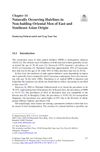 4 citations,
December 2014 in “PubMed”
4 citations,
December 2014 in “PubMed” Pre-operative hormone treatment for hypospadias surgery might improve outcomes, but more research is needed to confirm.
 32 citations,
September 2018 in “Clinical Obstetrics and Gynecology”
32 citations,
September 2018 in “Clinical Obstetrics and Gynecology” Hormone therapy for transgender females increases the risk of blood clots and requires careful dosing, monitoring, and lifelong management.
[object Object]  1 citations,
December 2010 in “Elsevier eBooks”
1 citations,
December 2010 in “Elsevier eBooks” Cell transplantation faces challenges in genitourinary reconstruction, but alternative tissue sources and microencapsulation show promise.
 18 citations,
February 2010 in “Odontology”
18 citations,
February 2010 in “Odontology” The document concludes that Rabson-Mendenhall syndrome requires novel treatments for insulin resistance and emphasizes the importance of dental care in affected patients.
 May 2023 in “IntechOpen eBooks”
May 2023 in “IntechOpen eBooks” More research is needed to understand how testosterone is maintained in adult males.
 19 citations,
February 2012 in “International Journal of Urology”
19 citations,
February 2012 in “International Journal of Urology” In Japan, sex reassignment surgery for gender identity disorder faces challenges and needs better medical support and education.
 1 citations,
December 2017 in “JAMA Facial Plastic Surgery”
1 citations,
December 2017 in “JAMA Facial Plastic Surgery” Artificial hair implantation using scaffolds is possible and PHDPE is more biocompatible than ePTFE.
 January 1995 in “Adolescent and pediatric gynecology”
January 1995 in “Adolescent and pediatric gynecology” Mutations in the androgen receptor gene cause different levels of androgen insensitivity, making it hard to create simple tests for the condition.

The document concludes that Syndromes of Severe Insulin Resistance are rare disorders with limited treatment options.
 March 2017 in “De Gruyter eBooks”
March 2017 in “De Gruyter eBooks” The Leechbook shows how hair and sexual health were key to medieval masculinity and some remedies may still be useful.
 30 citations,
June 2012 in “Current Opinion in Endocrinology, Diabetes and Obesity”
30 citations,
June 2012 in “Current Opinion in Endocrinology, Diabetes and Obesity” Nonclassic congenital adrenal hyperplasia is a genetic disorder causing hormone imbalances, affecting fertility and requiring personalized treatment.
[object Object]  September 2017 in “Springer eBooks”
September 2017 in “Springer eBooks” Older East and Southeast Asian men need less hair density for hair restoration satisfaction, and natural hairline features should guide surgery plans.












